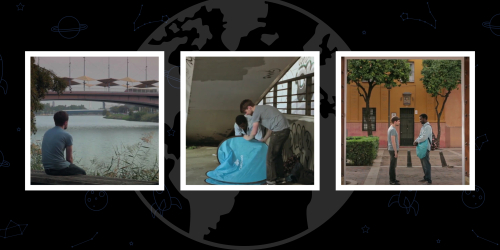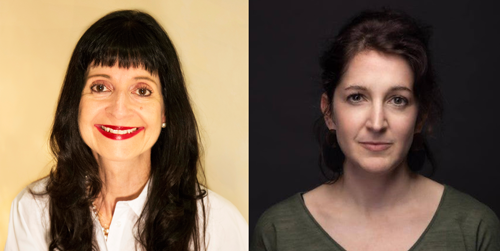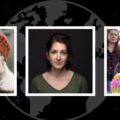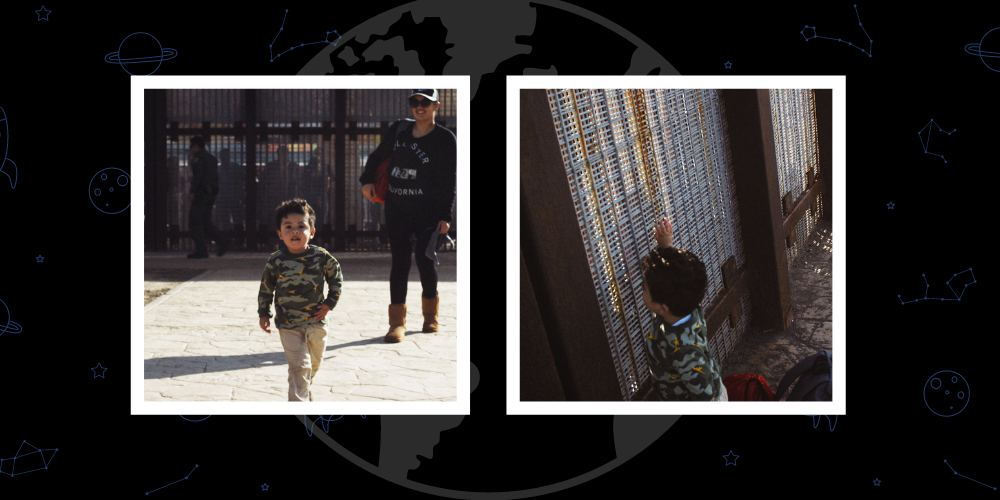This month, audiences can screen Refuge on the Planet Classroom Network. This film is curated by Planet Classroom.
Refuge, directed by Leticia Agudo, is a powerful film that explores the life of Lawrence, a Cameroonian refugee in Seville, Spain. Through realistic dialogue and stunning cityscapes, the film delves into the vulnerability and resilience of displaced individuals, highlighting humanity and solidarity across cultures: a thought-provoking cinematic experience.
The Global Search for Education is pleased to welcome Leticia Agudo.
What inspired you to create Refuge and tell the story of Lawrence, a Cameroonian refugee in Seville?
I wanted to turn the idea of seeking and giving refuge on its head in a very gentle, simple way. Now more than ever, the standard perception about people seeking refuge in Europe or the US is that “they” want everything from “us” – help, food, asylum, money, protection, jobs. It is a one-sided view of the relationship as, normally, “they” are not considered to have anything to offer. I wanted to explore what if the Westerner, in this case Irish, European, needed help from “the refugee”? What if the resources Westerners take for granted as we move through the world with ease—dismissively even sometimes of different cultures—were stripped away and we hadn’t bothered to learn a bit of the language and the ways of the foreign place, even if that place was within our “safe zone,” in this case another European city, Seville, my birthplace in southern Spain, historically a melting pot of cultures, ethnicities, and religions.
To find the character of the refugee, I wanted to enrich the film with the actors’ real-life experiences and sought to find a young man who had lived through risking everything to cross the sea from Africa to Spain in search of a better life. I enlisted the help of a Seville refugee aid and integration charity, Sevilla Acoge, and gave them a brief: I wanted the parallel in age and gender to our Irish character, a man in his early 20s who could speak English so they could communicate with ease. Eventually, we found Cletus Fonony, in his early 20s and from the minority English-speaking Cameroonian population. Cletus was then a recent Spanish citizen, studying and working in Seville, but had gone through an arduous journey to arrive there and had to live on the streets initially.
How did you approach capturing the real-life experiences and emotions of refugees in the film?
Before searching for someone who had been a refugee, I did think about writing a character and finding an actor to play them, but I decided there would be too many layers of separation to have a real impact on the screen, particularly for a no-budget short that had to be shot quickly, and that a docu-drama approach would be much more effective. Bobby, the co-writer, and I agreed to just write a scenario, the story arc in broad strokes with the elements that we wanted to explore in each scene. I had found the Irish actor, Tommy Harris, through auditions where I normally ask the actors to improvise around situations similar to the film’s, rather than get them to read scenes. I picked him for his openness to explore and his vulnerability. The two actors only met the evening before they had to shoot together, so I would get them to discover each other through the film, rather than know anything about each other beforehand.
Before shooting each scene, I would talk to them about their aims for the scene and what they needed to do or find out—sometimes separately, particularly to Tommy, who would lead with questions and then Cletus would respond naturally, from his own knowledge and experience. For the crucial tent night scene, I asked Tommy to act frustrated and annoyed, even accusatory, of “Lawrence’s” situation: “How could he live like this?!” His lack of understanding of Lawrence’s choices, as the character saw them, prodded Lawrence/Cletus to explain that he didn’t have any choices if he wanted to better his life and that of his family’s.
Can you discuss the challenges you faced during the production of Refuge and how you overcame them?
Shooting a drama as a doc was interesting because we were introducing a fictional situation in the middle of “real life,” sometimes in crowded areas of the city center. How we first approached it is that our tiny production team of four (camera, audio/production, writer/production, and I) test-shot all the outside scenes with ourselves as stand-ins before the actors arrived. We even put them quickly together on an editing timeline to see whether they worked. From this, I realized we needed a scene showing that Ruairí didn’t speak Spanish or knew the city well. So, when the Irish actor flew over and we all met with Lawrence, we knew how to approach the trickier exterior scenes.
Still, funny things happened. We needed to act in cameos in the actual film—ourselves and some family and friends. Paul, my husband, was “the thief” who grabs Ruairí’s bag from the café and runs with it. Every time we shot this scene, the people around us didn’t notice the DoP with a small DSLR camera following Ruairí following Paul, and they reacted to the robbery as real – Paul had people stopping him and shouting that they had caught the thief! I had to run behind and explain we were filming and was reprimanded by a local woman saying we should have a big notice about it—but the magic and the natural reactions of the people around us would have been lost. The interesting thing is that when we test-shot this scene, I stood in for the thief, and Paul for Ruairí and no one stopped me! This proved stereotype profiling at its best: Paul as the thief was a man with a black hoodie over his head, and I, a white woman in a crisp white shirt.
What message or impact do you hope Refuge will have on audiences worldwide?
For Western audiences, we wanted to hold up a mirror: what if it were the other way around? And it has been just that for many from European countries: the Spanish leaving during the civil war and dictatorship, the Irish going all over the world due to poverty and oppression, and plenty of Europeans who sought a better life all through the entire American and African continents, often exploiting its native populations way after colonization was over. Westerners have always moved countries for economic reasons, often imposing our cultures, way of life, and religion onto populations who had their own—why should we refuse refuge to others now?
Thank you, Leticia.
C. M. Rubin with Leticia Agudo.
Don’t miss Refuge, now streaming on the Planet Classroom Network. This film is curated by Planet Classroom.







Recent Comments